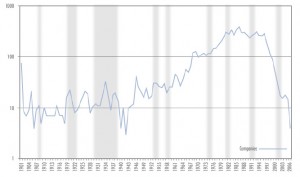Does the crisis have an impact on entrepreneurship. This was the question I was asked by Manuela Salvi on the Swiss Radio (RSR) today. You can listen to my answer (in French) by ckicking here.
Here is my answer in more detail: reality is complex and I am not aware of complete studies on the topic. However the Kauffman foundation has published an interesting report on the topic: Entrepreneurs and Recessions: Do Downturns Matter?
The data set used for this study was a comprehensive list of all 8,464 companies that have gone public on U.S. markets from 1975 to 2006. There were nine such [recession] periods in the timeframe in question: 1907–1908, 1918–1921, 1929–1939, 1953–1954, 1957–1958, 1973–1975, 1980–1982, 1990–1991, and 2001–2003. The figure below does not show big differences between recession and growth period with the exception may be of World War II and also the recent years. But it may be too early to say about the 2001-2006 period.
In another study entitled Economic Crisis Survey, the Kauffman foundation shows that 71% of American people believe that “in light of the economic crisis, it has become more difficult to become an entrepreneur in America”. However anecdotes are many which show real success: Texas Instruments, Revlon were started during the Great Depression, Microsoft, Apple during the Oil crisis. Without even talking about company creation, product launch such as Pampers in 1961 and the iPod in 2001 show that a crisis does not prevent innovation.
Here is an extract from the first report:
“At a high level we essentially are concerned with the relationship between the supply of companies (“births”) by founding period, and the outcome achieved by those date-based founding cohorts over time. To deal with this supply aspect, a few broad points can be made. The first is what we might call the scarcity argument. It says that fewer companies are founded during difficult economic times, so we can expect disproportionately fewer successful companies to emerge from that economically constrained population. Why might we expect fewer companies founded during recessions, for example?
There are several reasons. First, entrepreneurs might decide to delay creating companies until the economy into which they anticipate selling products or services is more robust. This argument applies most strongly to entrepreneurs in service industries where there is little lag time from company founding until first product/service sale. If there is a longer lag between company founding and product launch, we might not expect entrepreneurs, all else being equal, to hesitate as much in starting their new ventures. Why? Because first revenues might be anticipated to more likely coincide with a resurgent economy.
There are other reasons to expect fewer companies to be founded during economic downturns. One has to do with entrepreneurs’ unwillingness to leave their current places of employment during a weak economy. Another, and perhaps more compelling, obstacle to company founding in weak economic periods might be the limited availability of risk capital during such periods. To the extent that it is difficult to raise money for a new entrepreneurial venture, we might expect fewer companies founded during such periods.
The preceding touches mostly on supply issues—why we might (or might not) expect more companies to be founded during weaker economic periods. There also is a demand issue. Even if similar numbers of companies are founded, it is plausible that more of these companies do not achieve material financial success due to the poor economy at founding, thus leading to poorer longer-term outcomes for cohorts of companies founded during weak economic periods.
In summary, we can plausibly make three broad points. First, it is reasonable to expect that fewer companies will be founded during weak economic periods. Second, companies founded during those periods might be expected to fail at higher rates than companies founded during more economically receptive periods. Third, the combination of lower birth rates and higher failure rates would conspire to deplete company cohorts founded during recessionary periods.”
There is therefore some difficulty in assessing the impact. As a way to finish this post, without concluding, let me quote another blog (in French) envie d’entreprendre which explains why an entrepreneur would have a higher likeliness of success in periods of crisis:
“Since financing is more difficult to obtain, those who know how to operate in a low-cost, frugal environment have an edge. Since many people wait and see, even are “frozen”, using the crisis as an excuse not to act or cannot act because of lack of financing, there is less competition. Since there is less competition, the employment market is easier [and more talents are available]. Finally, the fact of being unemployed may be the opportunity to start the entrepreneurial adventure. ”
I like these arguments,
– less competition
– more talents available
– better efficiency because one has to be more frugal.
Periods of recession and crisis seem to create more opportunities but it remains clear that entrepreneurs always try, whatever the difficulty of the times.




Pingback: Start-Up: the book » Blog Archive » The crisis and the American model
i am working hard to be a good Entrepreneur in online services. I also attend online seminars to sharpen may skills.`~*
Hi, Valuable infos for my researching lesson. How can I improve myself in this subject? What is your suggestion? Thanks.
the best way to become a millionaire is to become an entrepreneur,~.
What a wonderful guide you wrote there! It really is wonderful to determine how people share data as you do, asking absolutely nothing in exchange. I very own a web site as well, which has a lot of data about making cash on the internet, is you’re interested, you can examine my website Moneymaker News
I chanced upon your site via a comment from another blogpost and am happy I did. Great stuff you’ve got here…not sure if it’s a bug or not but the header seems a little out of sync in my browser.
I have been exploring for a little bit for any high quality articles or blog posts on this sort of area . Exploring in Yahoo I at last stumbled upon this web site. Reading this info So i’m happy to convey that I’ve a very good uncanny feeling I discovered exactly what I needed. I most certainly will make sure to do not forget this web site and give it a look regularly.
Я заметил, некоторые блоггеры любят провоцировать читателей, некоторые даже сами провокационные комменты оставляют сами у себя на блоге
You truly make it seem truly straightforward along with your presentation but I discover this topic to be really one factor which I really feel I would by no means understand. It type of feels too complicated and very broad for me. I’m taking a look forward inside your subsequent submit, I will attempt to get the grasp of it!
Awesome read , I’m going to spend more time learning about this subject
hey your site design is often rather nice, nice and clean and updated content, get people to feel peace and I always enjoy browsing your webblog.